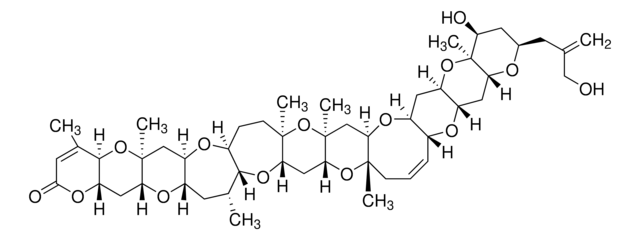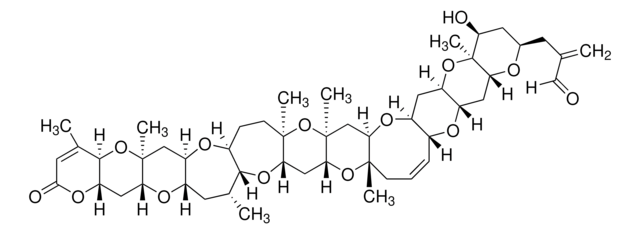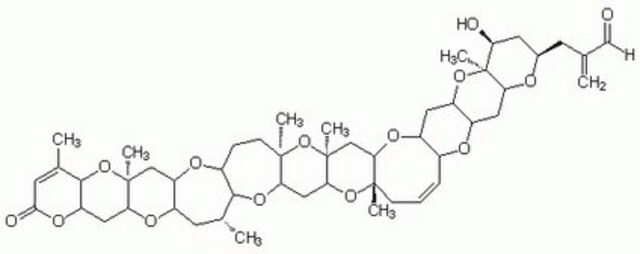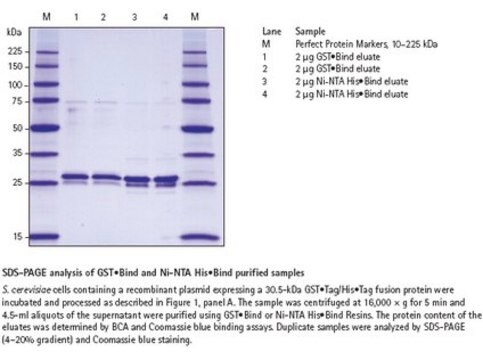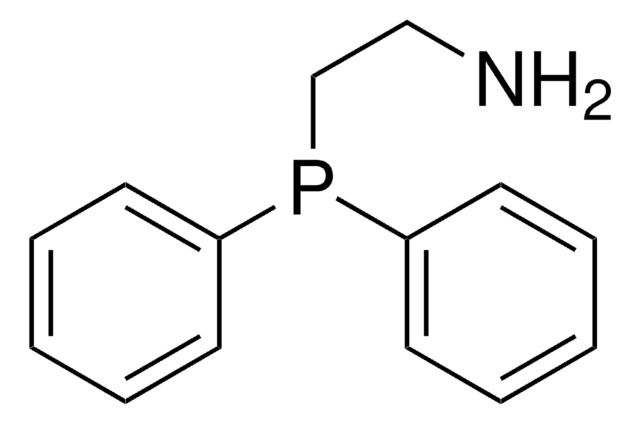203734-M
Brevetoxin PbTx-3, Ptychodiscus brevis
Lipid-soluble polyether marine toxin produced by the red tide dinoflagellate, Ptychodiscus brevis, found along the Gulf Coast of Florida.
Synonym(s):
Brevetoxin PbTx-3, Ptychodiscus brevis, Pumiliotoxin, Dihydrobrevetoxin B
About This Item
Recommended Products
Quality Level
Assay
>95% (HPLC)
form
solid
manufacturer/tradename
Calbiochem®
storage condition
OK to freeze
solubility
ethanol: 10 mg/mL
DMSO: 30 mg/mL
acetonitrile: 30 mg/mL
chloroform: 30 mg/mL
methanol: 30 mg/mL
water: sparingly soluble
storage temp.
−20°C
InChI
1S/C50H72O14/c1-25(24-51)14-28-17-37(52)50(8)41(54-28)19-33-34(61-50)18-32-29(55-33)10-9-12-46(4)42(58-32)23-49(7)40(62-46)21-39-47(5,64-49)13-11-30-44(60-39)26(2)15-31-36(56-30)22-48(6)38(57-31)20-35-45(63-48)27(3)16-43(53)59-35/h9-10,16,26,28-42,44-45,51-52H,1,11-15,17-24H2,2-8H3/b10-9-
InChI key
BKMHDYJRAAJTAD-KTKRTIGZSA-N
General description
Biochem/physiol Actions
Voltage-dependent Na+ channel activator
Warning
Reconstitution
Other Notes
Rein, K., et al. 1994. J. Org. Chem.59, 2107.
Edwards, R.A., et al. 1992. Mol. Brain Res.14, 64.
Trainer, V.L. 1991. Mol. Pharmacol.40, 988.
Tsai, M.C., and Chen, M.L. 1991. Br. J. Pharmacol.103, 1126.
Trainer, V.L., et al. 1990. ACS Symposium Series418, 166.
Baden, D.G., et al. 1988. Toxicon26, 97.
Poli, M.A., et al. 1986. Mol. Pharmacol.30, 129.
Shimizu, Y., et al. 1986. J. Am. Chem. Soc.108, 514.
Baden, D.G., et al. 1982. Toxicon19, 455.
Catterfall, W.A., and Risk, M. 1981. Mol. Pharmacol.19, 345.
Legal Information
Signal Word
Danger
Hazard Statements
Precautionary Statements
Hazard Classifications
Acute Tox. 1 Oral - Aquatic Acute 1 - Aquatic Chronic 1
Storage Class Code
6.1A - Combustible acute toxic Cat. 1 and 2 / very toxic hazardous materials
WGK
WGK 2
Flash Point(F)
Not applicable
Flash Point(C)
Not applicable
Regulatory Listings
Regulatory Listings are mainly provided for chemical products. Only limited information can be provided here for non-chemical products. No entry means none of the components are listed. It is the user’s obligation to ensure the safe and legal use of the product.
JAN Code
203734-100UG:
203734-100UG-M:
203734-UG:
Certificates of Analysis (COA)
Search for Certificates of Analysis (COA) by entering the products Lot/Batch Number. Lot and Batch Numbers can be found on a product’s label following the words ‘Lot’ or ‘Batch’.
Already Own This Product?
Find documentation for the products that you have recently purchased in the Document Library.
Our team of scientists has experience in all areas of research including Life Science, Material Science, Chemical Synthesis, Chromatography, Analytical and many others.
Contact Technical Service